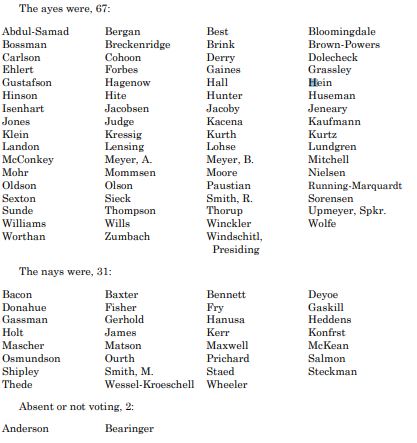It is said politics can make strange bedfellows. That was the case Monday night in the Iowa House when the legislative body debated a bill that would legalize sports wagering and fantasy sports in the state.
While the bill passed, it received bipartisan skepticism.
Rep. Tedd Gassman (R-Scarville) spoke against the bill.
“I’d much rather be trying to sell a good idea instead of trying to convince a no vote on a bad idea,” he said.
Gassman said there are four reasons he hears to support of legalizing sports betting:
- The Supreme Court said it was OK.
- We’re already doing it so we should control it and make it fair.
- We can tax it.
- Some people like to recreate in this manner.
However, just because the Supreme Court says something is constitutional does not mean it should be legalized.
“These guys have made mistakes before and will do so again,” he said.
Sports betting is the way for casinos to find their next victims, Gassman added. He said it costs more than $9,000 per year for a compulsive gambler in terms of social costs.
“The worst part of this whole thing is another nail in the coffin of our nuclear family,” Gassman said. “The family is the basic unit of government in this state and country. The family is the backbone of this nation. As the family goes, so goes the nation.
“Why would we do anything to lead them astray?”
Rep. Sandy Salmon (R-Janesville) also spoke against the bill, saying the funding in the bill to help with problem gambling is not enough to redeem the bill.
“If we think with this bill we’re not expanding gambling in the state of Iowa, we are only fooling ourselves and no one else,” she said. “We are definitely not fooling the people of Iowa.”
Salmon said it expands gambling in three ways — the type of gambling Iowa offers legally, the modes in which gambling can occur and in the number of Iowans who will gamble.
“Now that it’s legal they will try it and get sucked in,” Salmon said. “It’s especially true with the younger generation who don’t go to casinos but they are glued to the internet. This bill will usher in the biggest expansion of gambling in Iowa history.”
Salmon cited numbers from UNI and the Department of Public Health. She said seven out of 10 Iowans have gambled. She said 13 percent of Iowans are at-risk gamblers. Twenty-one percent of Iowans who currently play fantasy sports illegally are at-risk gamblers.
In Massachusetts it is reported that 5.7 percent of casino sports betters are problem gamblers. When sports betting went online that number rose to 18.2 percent. In Australia the country has seen a 70 percent increase in problem gamblers since the legalization of sports betting.
When the government legalizes an activity, Salmon said, people see that as legitimacy.
“People tend to think when something is legal that it is OK and safe and even helpful and that it can’t hurt you,” she said. “But we know what a lie that his.”
Salmon said gambling brings out the worst of human nature. It rips apart lives and families. It will lead to divorce, child abuse and domestic abuse. It drives people into bankruptcy and financial ruin and tempts them to commit crimes. Participants will suffer depression and anxiety and some will commit suicide.
“We’re trying to deal with mental health and this will contribute to it,” she said. “We who should know better are now putting a stumbling block in front of the citizens we are sworn to protect.”
Rep. Andy McKean (D-Anamosa) said he was in the legislature when gambling was first legalized in Iowa. It has progressively expanded despite initial promises that it would be very limited and stay very limited.
“When we started down the gambling road I think we were cognizant even back then that there was no turning back until gambling finally falls of its own weight,” McKean said. “And if you look at the history of gambling, that’s what will eventually happen. Unfortunately there will be a lot of hurt and unfortunate situations in the meantime. I regret to see this further expansion and strongly believe that it is not in the best interest of the people of our state.”
Rep. Skyler Wheeler (R-Orange City) spoke against the bill. He said he was OK with season-long fantasy sports, but daily fantasy sports and wagering on collegiate games was too far.
“I don’t see any gain for society in the state of Iowa with this bill,” he said. “I don’t know why we’re doing this. I don’t understand the point of what the overarching issue we’re trying to solve is.”
He also said he felt for other representatives who were being pressure by casinos in their district to vote against their moral objections to gambling.
Representative Mary Mascher (D-Iowa City) also expressed her opposition to the bill. She said Iowans don’t support it. She said Iowans want economic development.
“What positive good for society might be gained by legalizing sports betting?” she asked. “I haven’t heard one tonight.”
Gambling, Mascher said, is simply the redistribution of wealth.
“It’s economic impact is similar to throwing your money on the street for someone else to pick up,” she said. “It redistributes wealth without creating it.”
The state will spend $3 in state dollars for every dollar sports gaming or fantasy sports generates for the state. That is another reason Mascher did not support the bill.
Rep. Ourth (D-Ackworth) said he felt compelled to speak since he was in complete and total agreement with Gassman, Wheeler and Salmon.
“Where I come from gambling was always referred to as a vice,” Ourth said. “I don’t care whether the legislature anoints it, I don’t care who puts their magic wand on it or tries to say that it’s OK. Where I come from, it’s still a vice. No two ways about it.”
Ourth said it’s troubling how the legislature has found a way to rationalize legalizing sports wagering considering its pledge to do no harm.
“I can tell you every time we expand opportunities for this vice called gambling, it will definitely result in harm to someone,” he said. “I can remember as a child listening to my parents talking about friends of theirs. I can remember my father saying they had it made, they had everything anyone could ever want in life — until gambling got a hold of them.”
He highlighted the fact the legislature was building money into the legislation for treatment for all the problems the legislation will cause. He expressed concern over young people who will get involved with gambling.
“We are about to condone something that is going to put young lives in dire straits,” he said. “That’s not me just guessing at it. It’s not my own conjecture — these are proven facts that when societies do these kinds of things and legalize vice, especially for young people, well I’ll tell you what, we will reap the bitter harvests of having done this. There will be young lives that will be permanently damaged because of this. And there will be families all across this state that’ll make one slip of judgement — they’ll be weak in one moment and do something impulsively that they will live to regret forever because we said it was OK.”
The bill will put families at risk, Ourth said again.
“How much money do we need to run the state,” he asked. “I mean seriously. How much longer is this going to go on? How many other, in my view, quasi nefarious schemes are we going to come up with for more money? This is an exercise in greed and it troubles me greatly that we’re going to create new addicts, we’re going to create bankruptcies and we’re going to condone breaking up of families. These are very real things that are going to happen if we do this.
“If we pass this thing tonight, get ready to pay the price. I’ll tell you what, all that money that’s going to be in there for treatment is not even going to touch the social problems, and the family problems and the problems in young lives that no amount of money can ever fix. No amount of money is going to fix what’s about to happen. If we haven’t learned from our history, shame on us.”
Ourth said the legislature is addicted as well. The legislature, he said, is addicted to the revenue generated from gambling.
“So what’s next after this?” he asked. “Whose lives are we going to condone breaking and ruining after we get through doing this one tonight? I just can’t believe it. I certainly hope you’ll rethink your position on this because it’s going to have a terrible toll in human life and we’ve been charged with doing no harm.”
Representative Bobby Kaufmann (R-Wilton), who managed the bill on the floor, said doing nothing simply isn’t an option.
“Sticking our head in the sand is not an option,” he said. “Hoping that people get help when they’re placing bets in dark alleys with bookies whose collection method is a threat to kneecap you isn’t good for anybody.
“This bill will allow the people that need help to get help,” Kaufmann said. “I think it will give those, which are many, that want this freedom the opportunity.”
This was the vote on the bill:












